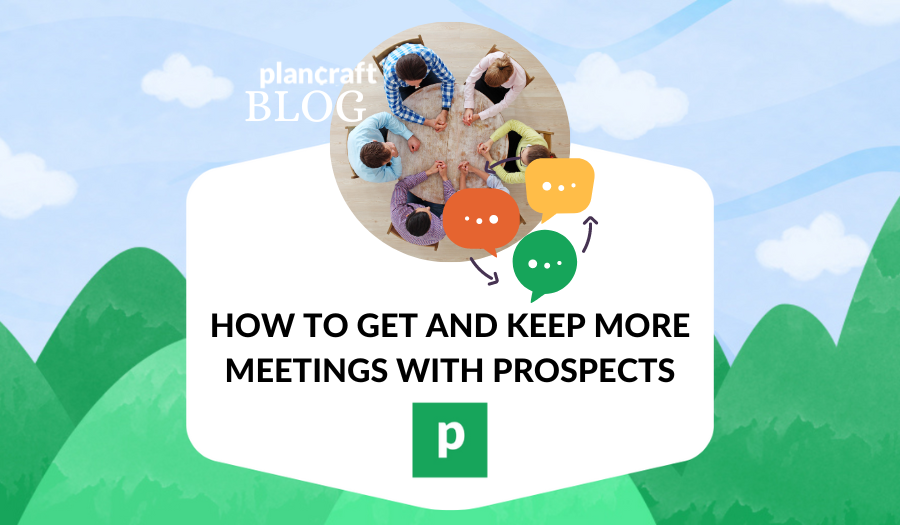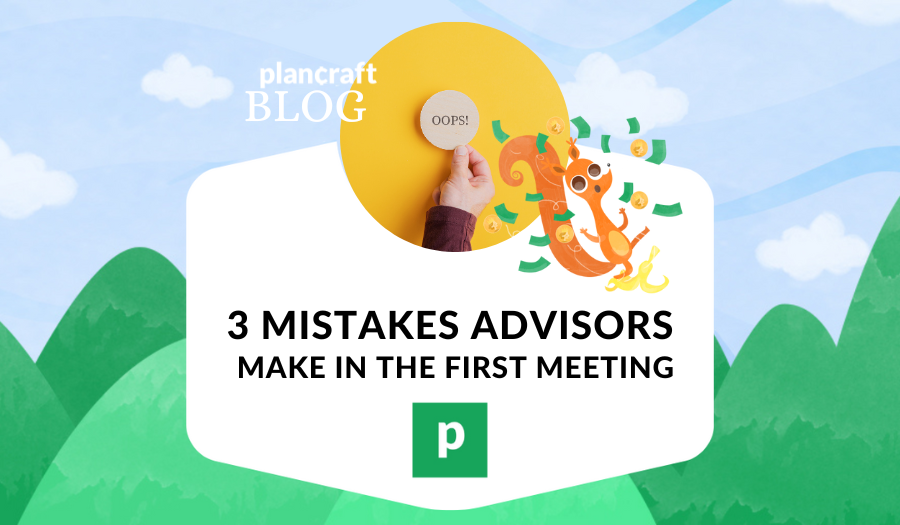Historic explorer Vasco de Gama didn't venture 'round the Cape of Good Hope without a map.
Legendary breadmaker Paul Hollywood doesn't bake a loaf without a recipe.
Grammy-award-winning cellist Yo Yo Ma doesn't perform without at least consulting sheet sheet music first.
Given all of this, why would any financial advisor go into a sales meeting without an agenda?It's true that a meeting agenda is your map, your sheet music, your recipe for success; it's also true that the most successful sales process involves sharing the agenda with clients and prospects towards the beginning of the meeting.
If you're not doing this, you're probably losing business that otherwise could have been won. Keep reading for a breakdown of why sharing your meeting agenda is so important, and how to do so in a way that really boosts your conversion rate.
Why to Share a Meeting Agenda
The heart of the reason for why you should always discuss your meeting agenda with prospects is that, more than anything else, you want them to be comfortable.
You're not going to close any prospective clients, especially not ones you're cold calling, if they're anxious and uncomfortable throughout your meeting.
Prospects aren't stupid: they know they're on a sales call, which means they know a sales pitch is inevitable. Knowing something is coming but not knowing when it's going to happen is not fun.
It's like the part in every horror movie where the protagonist is about to be mauled by the monster but you're not sure exactly what moment it's going to spring out and devour them.
If watching those parts of horror movies is your idea of a good time, imagine actually being the person in the film.
Now, financial advisors aren't monsters; quite the opposite, in fact: you're trying to help prospective clients retire earlier and with more money.
Your ability to do so, however, sort of depends on your being able to ease a prospect's mind and prevent them from feeling like horror movie protagonists when it comes to meeting time.
This, of course, makes sense: how could anyone possibly pay attention to your efforts to build a relationship or value proposition if they're constantly wondering when the sales pitch is going to come?
That's where reviewing your agenda comes into play.
If your first prospect meeting begins with an explanation of what you'll be covering during the call, the prospective client experience changes from horror film to roller coaster: knowing when the big drop is coming sets people at ease.
It may even help get them excited for the content of your call. (After all, you're going to help them retire sooner with more money, which is exciting!)
Effective Sales Meeting Agendas
Now that you understand the value of overviewing your agenda at the outset of meeting with prospective clients, let's dig into essential qualities of an effective agenda.
1) Build rapport
Before you dig into the meat and potatoes of a prospect meeting, you're going to want to take a moment to ensure that they won't simply hang up on you in the middle of your call.
You do this by building rapid rapport, quickly establishing personal connections between yourself and the prospect you're speaking to.
Does this sound like it's easier said than done? Perhaps, but there are some concrete steps you can take when starting a conversation with a new prospect that will result in building rapport quickly (so you can be sure to book the next meeting):
Compliment them
Back in the day, before Eric Arnold became the founder and CEO of Planswell, he sold window cleaning services door-to-door at a 95% close rate.
Part of the secret to his success was that he would force himself to find something about the person's house he could compliment right away as soon as they opened the door.
"Everyone loves to be sincerely recognized," he notes, with an emphasis on the word "sincerely." Most folks can smell bologna a mile away, and if a prospect thinks you're just saying a bunch of nonsense to get their business, you never will.
But what could you possibly compliment someone on if you're just cold calling them for the first time?
It might be difficult, given that you may not have all that much information about the prospect at this point. (Although, if you're a Planswell expert, you'll have access to 40+ data points and a comprehensive financial plan created by our software to mine compliments from.)
Simply complimenting them on having taken the step to create a financial plan or making the decision to work with a financial advisor is probably sufficient.
Ask questions
If you don't have enough information to give a genuine compliment to the prospect you're cold calling, that's okay — ask questions instead. (It's probably worth asking some questions too, even if you've already paid them a compliment.)
But don't ask just any questions. Small talk can be the death of any sort of meaningful relationship-building you hope to do with a prospect — if they feel trapped by tedious conversation, you can kiss your second meeting goodbye.
Instead, be genuinely curious about their lives; ask open ended questions that get the prospect talking more about themselves, their goals, their dreams, etc.
Also, make sure you're actually paying attention to the prospect's answers. They not only help you gather information you can use to offer more tailored services to them, but will also demonstrate that you care about them as a person, rather than a sales object.
Here's an example of a list of a few questions a financial advisor could ask a prospect to help foster genuine connection:
- What do you love about your work?
- What's challenging about your work?
- What's something you've done recently that you're particularly proud of?
- What goals do you have for yourself in the next 5 years? 10? 30?
- What are some of your priorities in life?
- What have you done in the past to ensure you’re on the right track financially?
- Who do you go to for financial advice?
- What does retirement mean to you?
This list is by no means comprehensive, nor should you feel like you should be asking all of these questions. Pick one or two that you feel like will illuminate their pain points and help give you a better understanding of your prospect as a person and then move on.
Asking too many questions could very well become tedious, and you definitely don't want that. You should always be respectful of a prospect's time.
2) Propose & agree on meeting goals
Once you've had the opportunity to do a little relationship building and your prospect understands that you're invested in their well being, it's time to share the goals you hope to achieve by the end of your meeting with them.
Here are a few examples of the kinds of goals that would be appropriate for financial advisors to have by the end of an initial prospect meeting:
- Learn about their short- and long-term life goals (when they want to retire, what kind of lifestyle they want to be able to live, any large-scale planning needs, etc.)
- Understand and assess their current financial situation
- Address any concerns they might have about their ability to meet those goals
- Highlight opportunities for improvement within their existing financial plan (for Planswell experts, who have access to prospects' financial plans before they call)
- Schedule a follow up meeting
Keep in mind that you don't want to try and accomplish too much on an initial call. Nobody wants to be on the phone longer than necessary (except maybe that one aunt we all have) and it's always better for a prospect to feel engaged and excited at the end of a call, rather than that they just went through a trying and tedious experience (like a phone call with that one aunt we all have).
Once you outline your goals, be sure to ask the prospect if they think that sounds good. Getting their verbal buy in is essential — it creates a social contract that few would have the gall to break.
Plus, if they say no (which they probably won't), you've saved yourself some valuable time by avoiding pitching to someone who was never going to give you their business.
3) Review & agree on a timeline
Reviewing your goals helps a prospect understand the ultimate outcome of your meeting, but you also want them to have a general road map of how you're planning on achieving those goals.
As such, you should share the general agenda you have planned. Here's a sample excerpted from the tried-and-true call script Planswell shares with their experts:
(Quick note: as mentioned earlier, Planswell experts go into their calls already having seen a complete financial plan built by our software for each of their prospects, which is where some of the language in our call script comes from.)
"First thing I like to do is give you a breakdown of how today's call is going to go, so you know what's going on. Before we review your plan, I'll tell you a bit more about me and my company and how we got started.
I'll also ask about your goals a bit more, to make sure I fully understand what you're trying to get out of this call. Then we'll jump into the plan and go over what the software recommended, and how it came to those numbers.
The end result will be you knowing what you need to do on a monthly basis to hit your goals. Do you have any questions before we get into things?"
As agendas go, this is fairly simple. All you've done is given a fairly general outline of the content of the first meeting so the prospect understands at all times where they are within the trajectory of the meeting.
Obviously, you'll adjust this script excerpt to reflect the nuances of each meeting you have, but the general flow of things should work well as a template.
The last sentence, however, is arguably the most important. You have to give the prospect some agency here, either by asking if they have questions or asking them to agree to your agenda.
Again, very few people will say "no, actually, that doesn't sound good," and even if they do, not pitching to people who have no chance of converting will save you a lot of time in the long run.
Ths Gist
Financial advisors need to ensure that, whether cold calling prospects or talking with current clients, their conversation partners feel comfortable and in control.
One of the best ways to do this is to not only have a set meeting agenda, but to share this agenda with each prospect at the outset of the call and get their verbal consent to following it.
Here's a few concrete steps you can take to ensure that each prospect feels in control during your meetings, which will ultimately result in you earning more business:
1) Build rapport
By talking informally to prospects at the outset of your calls, you can begin to establish a relationship with them that goes beyond you simply trying to earn their business. The two best ways to begin to build such rapport are to pay compliments to the prospect, and to ask open ended, genuinely curious questions about their life and goals.
2) Propose & agree on meeting goals
If you discuss what you, as a financial advisor, are hoping to get out of calling this prospect, they will feel more comfortable because they won't be constantly worrying that you're going to end up talking them into buying something they don't need.
These goals should have more detail than simply you wanting to earn their business. Instead, consider what you might want to learn about the prospect, what you hope to understand about their current situation and short- and long-term goals.
Always be sure to get prospects' verbal agreement for any goals you outline.
3) Review & agree on a timeline
Once you establish where your conversation will be going, you want to give your prospect an idea of how you plan to get there. All this means is briefly talking through each of the steps you'll take during the call in order to achieve the agreed-upon goals.
Things like explaining the services your company provides, asking the prospect what they hope to get out of talking to you, and ultimately asking for their business are all good touchpoints here.
Be short and sweet and, like with your goals, ask your prospects to agree to the agenda before you dive in.









